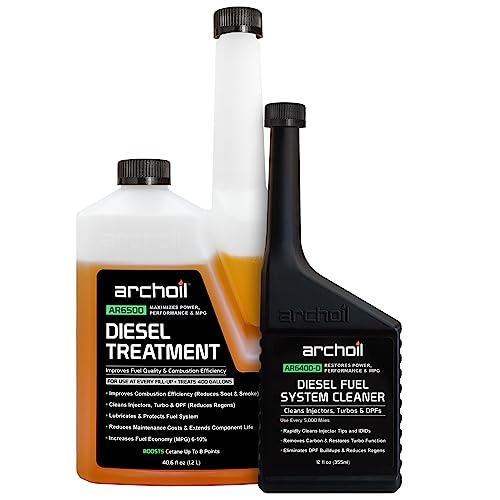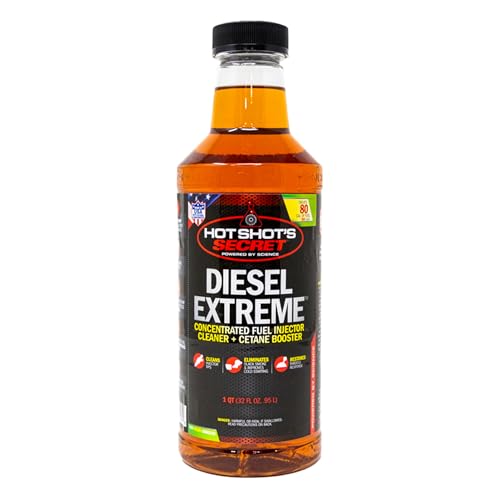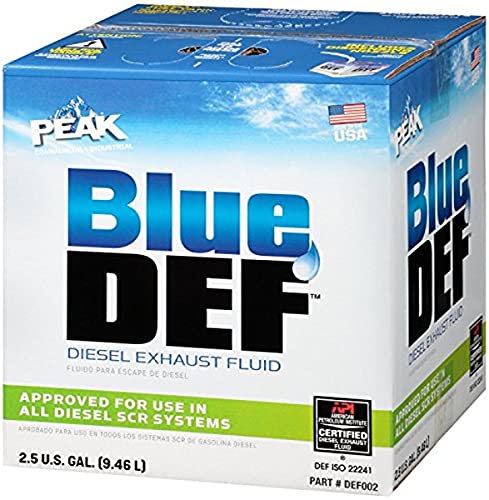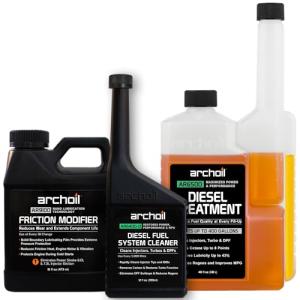Fuel Additives: Do They Really Make a Difference in Your Truck's Performance?
Let's face it, you want your truck to run smoothly and efficiently, and you've likely heard the pitch for diesel fuel additives as a way to boost your truck's performance. In the vast automotive landscape of the United States, where diesel engines power everything from long-haul trucks to hard-working pickups, the question of maximizing fuel efficiency is ever-present. But do these additives actually live up to their claims, or are they simply a drop in the bucket of automotive folklore?
In the race for peak performance and extended engine life, additives emerge as a tempting pit-stop for truck owners. With products boasting promises from cleaner injectors to a smoother ride, it might seem like a no-brainer to give your diesel engine a little extra love. But let's pump the brakes for a moment and delve into what the research says, examining whether these popular potions can truly make a noticeable difference or if they're just another expense in the fine print of truck ownership.
Key Takeaways
- Advancements in Diesel Technology: Newer, well-maintained trucks already benefit from high fuel quality and engine design, potentially diminishing the influence of additives.
- Older Truck Optimization: Trucks with more miles might see improvements with additives helping to clear up accumulated buildups.
- Pre-Blended vs. Aftermarket: Consider the benefits of pre-blended fuels with additives like Chevron's Techron versus aftermarket options.
- Evidence-Based Decision: Look for independent studies, such as the 2016 AAA research, to verify the effectiveness of diesel fuel additives you consider using.
- Professional Advice: Always consult your truck’s manual and a certified professional to decide on the suitability of additives for your specific diesel engine.
- Be Consumer-Savvy: Stay informed and skeptical about the myriad of additives available, focusing on reputable products with proven benefits.
The Role of Fuel Additives in Modern Diesel Engines
With advancements in diesel engine design, the application of diesel fuel additives has evolved significantly. These additives, including diesel fuel enhancers and diesel performance additives, are tailored to meet the contemporary demands of improved efficiency and reduced emissions. It is important to understand how these products function within your diesel engines and whether they are of substantial benefit to your truck's performance and maintenance routine.
Understanding the Basic Functions of Diesel Fuel Additives
At their core, diesel engine additives perform a myriad of functions designed to protect and optimize the intricate workings of a modern diesel engine. Among their key roles, they act as a diesel fuel stabilizer to prevent degradation of the fuel, especially during extended periods of storage. Additionally, such additives work as crucial agents to clean and prevent deposits, direct lubrication to essential components, enhance fuel flow, and offer protection against the cold by preventing fuel freezing.
https://www.youtube.com/watch?v=_nr-n4Dyv3Y
The usage of diesel fuel treatment products can be seen as an investment in the health and efficiency of your vehicle. However, with each diesel engine's specifications being unique, the effectiveness and need for additional treatment vary.
Pre-Blended vs. Aftermarket Diesel Additives: A Comparison
Vehicle owners often face a choice between pre-blended fuels that incorporate various additives or utilizing aftermarket solutions to supplement their fuel manually. To aid in this decision, consider a simple comparison:
| Aspect | Pre-Blended Diesel Fuels | Aftermarket Diesel Additives |
|---|---|---|
| Additive Integration | Incorporated during fuel production | Added by consumer to fuel tank |
| Performance | Meets standard engine requirements | Customizable to engine's needs |
| Emissions | Generally formulated to lower emissions | Varies by product; potential to further reduce emissions |
| Convenience | Ready-to-use with no additional steps | Requires manual application; not always convenient |
This comparison showcases the core differences, providing you with an informed foundation on which to base your choice.
Are Fuel Additives Essential for New Diesel Trucks?
When it comes to new diesel trucks, the necessity of additional diesel fuel additives is a topic of debate. Manufacturers have significantly raised the bar in terms of fuel standards and engine efficiency, leading one to question the requirement of supplemental additives. It comes down to the manufacturer's specifications and the quality of fuel being used. Therefore, it is imperative to consult your vehicle's documentation and consider expert recommendations before introducing any additives into a modern diesel engine.
In conclusion, while the advantages of diesel fuel treatment products can potentially elevate the performance and maintenance of diesel engines, their application should be deliberated with a thorough comprehension of your truck's needs and in adherence to prescribed guidelines.
Can Diesel Fuel Additives Improve Fuel Economy in Trucks?
When it comes to enhancing fuel economy in your diesel truck, you may be considering the use of additives. Indeed, the promise of reduces fuel consumption can be particularly enticing. However, it's important to understand the efficacy of these products in various scenarios—especially when making an investment in what is often marketed as the best diesel fuel additives.
For the latest and routinely serviced vehicles, the already optimized diesel fuels mean that the room for improvement via additives is marginal. Conversely, those with older trucks might find these diesel fuel efficiency boosters beneficial for mitigating the impacts of carbon buildup on their engines, which can, in turn, improve diesel fuel economy.
"Truck owners should remain cautious of additives touting drastic fuel economy gains, particularly in newer models." - Federal Trade Commission
Here's a closer look at the potential benefits of fuel additives:
- May clean engine deposits, allowing for more efficient operation in older trucks
- Could offer minor improvements in fuel economy by restoring engine conditions
- Some additives may extend the life of your diesel fuel, adding to overall economic savings
To provide a clearer picture, let's delve into some data:
| Additive Type | Possible Benefits | Considerations |
|---|---|---|
| Cetane Boosters | May improve ignition quality and efficiency | Best results in older or low-performance engines |
| Detergent Additives | Claims to clean engine deposits | Effectiveness can vary greatly between brands |
| Lubricity Enhancers | Intended to reduce engine wear | Might not be necessary for already well-lubricated modern engines |
| Fuel Stabilizers | Can preserve fuel quality during long-term storage | More relevant for infrequently used vehicles |
It's worth noting that in some cases, regular use of quality diesel fuel without aftermarket additives may only yield up to a 4% variation in fuel economy. This illustrates the importance of considering regular maintenance such as regular tune-ups, timely oil changes, and proper tire inflation to ensure optimized fuel efficiency.
In conclusion, while some diesel fuel economy improvements are feasible through specific additives, the mileage may vary based on the condition and age of your truck. Adhering to your vehicle manufacturer's maintenance schedule and using high-quality diesel are paramount to achieving and maintaining peak fuel efficiency.
Evaluating the Benefits of Cetane Boosters for Diesel Performance
When refining the quality of diesel fuel, a paramount component that emerges is the cetane number. Much like the octane rating for gasoline, the cetane number denotes the combustion quality of diesel fuel and influences the overall performance of your diesel engine. Utilizing cetane boost additives can signify a critical step towards optimizing your truck's operability.
What Are Cetane Boosters and How Do They Work?
Cetane boosters are specialized additives designed to increase cetane numbers in diesel fuel. By elevating the fuel's ignition characteristics, these boosters facilitate quicker and more complete combustion cycles, which can lead to more efficacious startups and smoother engine operations. Whether it's to achieve a modest enhancement or raise cetane up to 8 points, the end goal is to upgrade your truck's performance in tangible ways.
https://www.youtube.com/watch?v=Qh1tYUthh6Q
The Impact of Increased Cetane on Diesel Engine Efficiency
Inefficiencies in diesel engines often stem from poor combustion quality, leading to increased fuel consumption and higher emissions. By integrating cetane boost additives, you can potentially mitigate these issues. The result? A more efficient burn that contributes to lower operational costs and a reduced environmental footprint—an advantage not to lose sight of.
Real-World Data: Cetane Boost and Its Effects on Trucks
Real-world applications reveal a clear narrative: trucks operating with enhanced cetane numbers exhibit notable improvements in responsiveness and emissions. However, it's essential to weigh the benefits against the cost. Not all diesel engines will experience the same level of improvement, and for some, the investment in top diesel fuel additives or specifically formulated diesel cetane improver may not yield cost-effective outcomes.
To decisively navigate the realm of cetane improvement, consider the unique specifics of your diesel engine and consult with manufacturers or professionals. By doing so, you can ensure that it is not just an additive you are adding to the tank, but a strategic enhancement to your truck's longevity and performance.
How Diesel Fuel Additives Affect Cold Weather Operation
When the mercury plunges, diesel drivers face the season-specific challenge of dealing with fuel gelling and fuel-filter icing. These problems can bring your vehicle to a standstill, turning brisk winter mornings into unwanted roadside intermissions. To thwart these issues, a variety of diesel fuel additives are at your disposal, engineered to prevent the woes cold weather throws at your fuel tank.
Fuel gelling in cold climates is a particular worry for truck operators, as the diesel can transform into a gel and impede fuel flow. Diesel fuel cold flow improvers tackle this by lowering the fuel's pour point, ensuring that it remains liquid and your engine keeps humming. Alongside these flow improvers are additives designed to prevent fuel-filter icing, a condition where water in the fuel system freezes, blocking the filter. By using these fuel treatments for cold weather, such as additives that act as de-icing agents, your truck stays reliable in even the most frigid conditions.
| Additive Type | Function | Benefits |
|---|---|---|
| Cold Flow Improvers | Prevents fuel gelling | Maintain fuel flow at low temperatures |
| Anti-Gel Additives | Lowers the pour point of diesel | Reduces the risk of gelling |
| De-Icing Agents | Prevents water in fuel from freezing | Prevents fuel-filter blockages |
| Combination Treatments | Targets both gelling and icing | Comprehensive cold weather defense |
In sum, don't let cold weather hold you back. With the right fuel treatments for cold weather, such as a potent diesel fuel cold flow improver, you'll sail smooth over winter's challenging terrain, keeping fuel gelling and fuel-filter icing at bay.
Diesel Injector Cleaners: Myths vs. Facts
When it comes to maintaining your truck's performance, the purity of your fuel system is non-negotiable. Among the array of maintenance products, diesel injector cleaners stand out as a popular solution for keeping the injectors free of clogs and ensuring efficient fuel combustion. Understanding the balance between real diesel injector cleaning benefits and common misconceptions is essential for any discerning truck owner.
The Importance of Clean Diesel Injectors for Truck Performance
A truck's heartbeat lies in its engine, and clean diesel injectors are the vessels that keep it robust. Without them functioning properly, you could face a host of performance issues. Injectors that are free from dirt and deposits ensure an accurate spray pattern, better combustion, and ultimately, a smoother running engine. Relying on top-rated diesel additives can be a critical step in fuel injectors maintenance and performance longevity.
What Consumers Need to Know About Diesel Injector Cleaners
The marketplace offers an array of diesel injector cleaners, each promising to resolve specific fuel system issues. However, it's crucial to differentiate between overblown claims and the true capabilities of these products. Real-world results have shown that trusted cleaner formulations can indeed restore performance, especially in older trucks or in cases where fuel system neglect has occurred. But for best results, pairing the use of diesel injector cleaners with regular professional maintenance can lead to an ideal equilibrium of performance and reliability for your diesel engine.
Remember, not all cleaners are created equal. Seeking professional advice and opting for validated, highly-regarded products is your best bet for reaping the real advantages of diesel injector cleaners.
Diesel Fuel Additives and Their Role in Engine Longevity
As you consider the health and efficiency of your diesel engine, the topic of diesel fuel additives often comes up. These additives, ranging from detergents to lubricity enhancers, make strong claims about increasing engine longevity and improving overall system performance. But, are these claims backed by solid evidence, and how do they fit into a routine of preventive maintenance?
Preventive Maintenance: How Additives Contribute to Engine Health
Preventive maintenance is key to ensuring your diesel engine runs smoothly for years to come. Utilizing the best additives for diesel engines can play a significant role in this maintenance by keeping engines clean and less susceptible to the damaging effects of wear and corrosion. Additives such as diesel fuel treatments are formulated to enhance fuel quality – boosting cetane levels for quicker starts and reducing the buildup of deposits that can hamper engine efficiency.
Addressing the Skepticism: Long-Term Benefits of Fuel Additives
The skepticism surrounding fuel additives is not unfounded, as mixed results have been reported regarding their efficacy over the long term.
Despite the ample claims, a discerning owner must look at additives' scientifically proven advantages: assisting in maintaining engine cleanliness and efficiency as a supplement to regular maintenance procedures.
It's not about seeking miracle solutions but rather about integrating quality additives into a comprehensive care regimen tailored to your engine's needs.
| Additive Type | Main Benefit | Frequency of Use | Relevance to Engine Longevity |
|---|---|---|---|
| Detergents | Clean fuel injectors and combustion chamber | As specified by manufacturer | High |
| Corrosion Inhibitors | Protect fuel system components | With each fill-up or as recommended | Moderate to High |
| Cetane Boosters | Improve ignition quality of diesel fuel | Periodically or as needed | Low to Moderate |
| Anti-gel Additives | Prevent fuel gelling in cold weather | During winter or in cold areas | Seasonally Important |
While many diesel engine additives are available on the market, it's crucial for you to select them judiciously, based on the type of engine you have and the specific issues you aim to address. The preventive maintenance these products offer is most effective when paired with regular servicing and consultations with your engine's manufacturer. This balances the benefits of additives with the established needs of your diesel engine, paving the way for optimal engine longevity and performance.
The Truth About Diesel Fuel Stabilizers and Conditioners
When it comes to maintaining your diesel engine, keeping the fuel in optimal condition is paramount, especially if your vehicle experiences irregular use or prolonged storage. This is where products like diesel fuel stabilizers and diesel fuel conditioners come into play, asserting that they can safeguard against fuel degradation and enhance engine performance. But, are these claims backed by solid evidence? And more importantly, do you really need them for your diesel engine?
Diesel fuel stabilizers are pitched as essential for preventing the breakdown of diesel fuel over time. They are particularly relevant for engines that sit unused, whereby the fuel might otherwise deteriorate, leading to startup issues or even damage to the fuel system. On the other hand, diesel fuel conditioners aim to improve fuel lubricity, provide cleaning action to fuel systems, and shield against corrosion.
While it is true that modern diesel fuels are formulated with a mixture of additives, these supplemental products promise further benefits. If you consider employing a fuel additive for diesel engines, it's important to evaluate both their cost and the actual tangible benefits they might provide. Think of these additives like a dietary supplement: just as some supplements can fill nutritional gaps, so too can certain fuel additives complement and enhance your engine's diet.
Below is a comparison to consider when choosing diesel fuel performance additives, specifically stabilizers and conditioners:
| Additive Type | Main Purpose | Benefits | Suitable For |
|---|---|---|---|
| Diesel Fuel Stabilizer | Preserve fuel quality during storage | Prevents fuel degradation and oxidation | Seasonal or infrequently used vehicles |
| Diesel Fuel Conditioner | Enhance fuel lubricity and system cleanliness | Cleans fuel system, protects components, improves lubricity | Vehicles operated in varied conditions |
In conclusion, while the diesel engine market is flooded with diesel fuel performance additives, not all are created equal. Those considering a diesel fuel enhancer should seek out products with a proven track record of efficacy. A skeptical eye and a focus on substantiated benefits can help ensure that such additives truly contribute to the health and longevity of your diesel engine.
"Bottle Treats": Are They Really a Cost-Effective Solution?
When shopping for diesel fuel performance enhancers, you may have come across the term "bottle treats." These aftermarket diesel fuel additives, which are conveniently packaged in single-use or small treatment-size bottles, promise an immediate boost in your truck's performance and an increase in fuel economy. Are they truly a cost-effective diesel additive and an economical fuel treatment option? Let's delve into the matter.
For equipment owners, the appeal of bottle treats lies in their advertised ability to swiftly improve the condition of pumps and injectors, leading to increased efficiency on the road. Indeed, some truck operators report noticing enhanced injector cleanliness and a slight uptick in overall performance post-application. However, the broad spectrum of additives on the market means the actual effectiveness can vary, with some providing palpable results while others fall short of the claim. Whether these products can be deemed "cost-effective" depends on the individual circumstances of use and cannot be generalized without a thorough, long-term evaluation of their impacts.
It's essential to approach these diesel fuel performance enhancers with a judicious eye. They should complement a well-rounded maintenance routine, not replace it. Determining if bottle treats offer a good return on investment necessitates rigorous performance tracking and a clear understanding of your truck's specific needs. While some may find them to be an economical fuel treatment, others may see minimal gains relative to their cost. Therefore, before opting for bottle treats, weigh their promised benefits against your truck's maintenance records and operational demands to make an informed decision on their potential cost savings.
FAQ
Do diesel fuel additives really improve my truck's performance?
Diesel fuel additives can enhance the performance of your truck by cleaning the engine deposits, improving fuel economy, and boosting cetane levels, particularly in older or poorly maintained diesel engines. However, the impact on new, well-maintained trucks may be less significant.
How do diesel fuel additives function in modern diesel engines?
Diesel fuel additives serve to clean injector deposits, enhance lubrication, improve the flow of fuel, and prevent fuel freezing. These functions contribute to the efficiency and longevity of modern diesel engines.
What is the difference between pre-blended and aftermarket diesel fuel additives?
Pre-blended diesel fuels come with additives included to meet certain standards and performance levels, while aftermarket diesel additives are added to the fuel by the consumer to address specific issues or enhance certain characteristics of the fuel.
Are fuel additives necessary for the latest diesel trucks?
For new diesel trucks that are regularly maintained, the need for aftermarket fuel additives is minimal due to higher fuel quality and standards. However, for older or high-mileage trucks, diesel fuel additives may offer more noticeable benefits.
Can diesel fuel additives lead to improved fuel economy in trucks?
While some diesel fuel additives claim to improve fuel economy, the actual impact varies. Vehicles that are newer or that have been well-maintained are less likely to see a significant improvement as opposed to older or poorly maintained trucks.
What are cetane boosters and how do they function?
Cetane boosters are additives that increase the cetane number of the diesel fuel, which can improve engine startup times, reduce engine noise, and enhance performance by improving the fuel's ignition quality during combustion.
What effects does increased cetane have on diesel engine efficiency?
Increased cetane in diesel fuel can enhance engine responsiveness, reduce emissions, and provide a smoother operating experience. However, the magnitude of these benefits can vary depending on the engine type and its condition.
How do diesel fuel additives impact truck operation in cold weather?
Diesel fuel additives designed for cold weather, such as cold flow improvers and de-icing agents, prevent fuel gelling and fuel-filter icing, ensuring reliable performance and preventing potential fuel-related issues during cold weather operation.
What should consumers know about diesel injector cleaners?
Consumers need to know that while diesel injector cleaners can remove carbon deposits and improve engine performance, their effectiveness varies. It's important to choose reputable brands and verify claims to match the specific needs of their trucks.
How do diesel fuel additives contribute to engine longevity?
Diesel fuel additives may contribute to engine longevity by cleaning and protecting engine parts, which can theoretically extend an engine's lifespan. Consistent use of quality additives can maintain engine cleanliness and efficiency, but evidence of the long-term benefits is mixed.
Are diesel fuel stabilizers and conditioners worth using?
Diesel fuel stabilizers and conditioners can preserve fuel quality during storage and enhance engine condition. Assessing whether they offer tangible benefits and are cost-effective depends on individual circumstances and the specific equipment being used.
Are 'bottle treats' diesel fuel additives a cost-effective solution for trucks?
"Bottle treats" may provide some benefits, such as improved injector cleanliness, but their cost-effectiveness is variable. It's essential to assess their impact on fuel efficiency and engine health over time and consider regular maintenance as a priority.
Source Links




